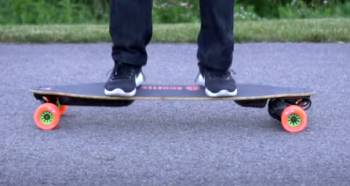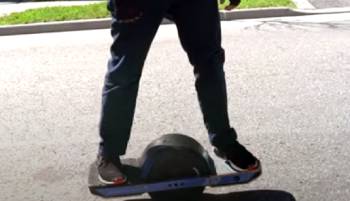In the world of electric personal transportation, two big players have emerged: Boosted Board and Onewheel. These brands are often compared side by side, with enthusiasts passionately advocating for their favorite ride. But which one is truly the better option?
In this comprehensive article, we’ll delve into the pros and cons of both the Boosted Board and Onewheel, and help you decide which one is right for you.
A Brief Comparison Table
| Feature | Boosted Board | Onewheel |
| Top Speed | 22-24 mph (depending on the model) | 19 mph |
| Range | Up to 14 miles (depending on the model) | 12-18 miles (depending on the model) |
| Controls | Handheld remote | Body weight shifting (intuitive) |
| Off-Road Capability | Limited | Excellent |
| Terrain Adaptability | Best on paved surfaces | Performs well on various terrains |
| Learning Curve | Easier to learn | Steeper learning curve |
| Price Range | $1,000 – $1,600+ | $950 – $1,800+ |
| Maneuverability | Excellent, responsive controls | Good, but can be trickier for beginners |
| Portability | Easier to carry and store | Bulkier, more challenging to transport |
| Unique Riding Experience | Traditional skateboard-like experience | One-of-a-kind self-balancing experience |
| App Support | Third-party apps available (Ride App, esk8.club) | Official Onewheel app available |
The Contenders: Boosted Board and Onewheel
Before we dive into the specifics, let’s take a quick look at the key features of each device. The Boosted Board is an electric skateboard with a handheld remote, boasting powerful motors and a sleek design. On the other hand, the Onewheel is a self-balancing, single-wheeled electric board controlled by shifting your body weight.
Boosted Board: Pros

- Speed and Acceleration
One of the most significant advantages of the Boosted Board is its speed. With a top speed of 22-24 mph (depending on the model), it allows riders to quickly zip through city streets and reach their destinations with ease.
- Range
The Boosted Board offers a solid range, with some models capable of covering up to 14 miles on a single charge. This makes it ideal for commuters or those looking for a fun way to explore their city.
- Maneuverability
The Boosted Board’s responsive and precise controls make it easy to navigate through tight spaces, weave in and out of traffic, and take sharp turns with confidence.
Read More: About Comparison Between AER Travel Pack 3 And Peak Design Travel Bag
Boosted Board: Cons
- Price
One of the main drawbacks of the Boosted Board is its relatively high price. With models ranging from $1,000 to over $1,600, it can be quite an investment for some riders.
- Limited Off-Road Capabilities
The Boosted Board is primarily designed for paved surfaces, meaning it struggles on rough terrain or off-road environments. This can limit its versatility for some riders.
- Dependence on Remote
The Boosted Board’s reliance on a handheld remote for control can be a downside for some, as it requires constant attention and can be easily misplaced or damaged.
Onewheel: Pros

- Unique Riding Experience
The Onewheel’s self-balancing design and single-wheel setup offer a truly unique and engaging riding experience that many riders find addicting.
- Off-Road Capabilities
The Onewheel shines when it comes to off-road performance. Its large tire and rugged design allow it to easily traverse rough terrain, making it perfect for outdoor enthusiasts and adventure-seekers.
- Intuitive Controls
With no remote needed, the Onewheel is controlled by simply shifting your body weight. This intuitive method of control makes it easy for riders to pick up and enjoy.
Also Read: Comparison Between Crocband And Bayaband
Onewheel: Cons
- Speed and Range
Compared to the Boosted Board, the Onewheel has a lower top speed (19 mph) and a slightly shorter range (12-18 miles, depending on the model). For some, this may be a deal-breaker.
- Learning Curve
While the Onewheel’s controls are intuitive, there is a steeper learning curve compared to the Boosted Board. New riders may need more time and practice to feel confident on the Onewheel.
- Price
Like the Boosted Board, the Onewheel is also on the pricier side, with models ranging from $950 to over $1,800.
Frequently Asked Questions (FAQs)
This is a subjective question, as what is “better” depends on individual preferences and needs. If you prioritize speed, range, and maneuverability on paved surfaces, the Boosted Board may be a better fit. If you’re seeking a unique riding experience with off-road capabilities and intuitive controls, the Onewheel might be the better option.
Opinions on Reddit are varied, with users passionately advocating for both Boosted Board and Onewheel. Ultimately, the choice between the two will come down to your personal preferences, riding style, and intended use. It’s a good idea to try out both devices if possible before making a decision.
Boosted Board faced financial difficulties in 2020, which were exacerbated by the COVID-19 pandemic. This led to the company’s eventual shutdown. However, the Boosted brand and its intellectual property were acquired by Lime, a scooter-sharing company, ensuring that Boosted products will continue to be supported.
While Boosted Board did face financial challenges and ultimately shut down, its brand and intellectual property were acquired by Lime. This acquisition ensures that existing Boosted products will continue to receive support and that the Boosted brand will live on.
There are several third-party apps available that can replace the functionality of the Boosted app, such as Ride App and esk8.club. These apps allow users to track their rides, monitor battery life, and access other useful features for their Boosted Board.
As of 2020, the Boosted brand and its intellectual property are owned by Lime, a scooter-sharing company. Lime acquired Boosted after the company faced financial difficulties and ceased operations.
Final Thoughts
Both Boosted Board and Onewheel have their unique advantages and disadvantages. The choice between the two ultimately comes down to personal preferences, riding style, and intended use.
By considering the pros and cons outlined in this article, you’ll be well-equipped to make an informed decision on which electric personal transportation device is right for you. Happy riding!



